Future Education system likely to be....
Why should Teacher community Update themselves according to Future changes in Education System ?
The future education system is likely to undergo significant changes due to technological advancements, evolving societal needs, and changing learner expectations. Here are a few key trends that might shape the future of education:
1. Personalized Learning: Artificial intelligence and data analytics will enable personalized learning experiences, allowing educators to tailor lessons based on individual student needs, learning styles, and progress.
2. Blended and Hybrid Learning: A mix of in-person and online learning is likely to become the norm, providing flexibility for students and educators to access content from anywhere. This model allows for the best of both worlds—face-to-face interaction and the convenience of digital tools.
3. Lifelong Learning: The rapid pace of technological change will require continuous learning throughout one's life. Microcredentials, certifications, and skill-based learning platforms will become more prevalent as people seek to upskill or reskill for new job markets.
4. Experiential Learning: Hands-on, project-based learning will become more emphasized as industries demand practical skills. Innovation labs, maker spaces, and real-world problem-solving environments will play an essential role.
5. Global Classrooms: Education will become more interconnected across borders, with students able to attend virtual classes from institutions around the world. This will promote cultural exchange and broaden perspectives.
6. AI-Assisted Teaching: AI tools will assist teachers by automating routine tasks like grading, lesson planning, and even generating assessments. Educators will have more time to focus on student interaction and fostering creativity.
7. Virtual Reality and Augmented Reality: These immersive technologies will allow students to engage with subjects in entirely new ways, whether through virtual field trips, historical reenactments, or interactive simulations.
8. Focus on Soft Skills: As automation takes over repetitive tasks, there will be a growing focus on teaching creativity, critical thinking, emotional intelligence, and problem-solving—skills that are harder for machines to replicate.
These changes suggest a future where education is more adaptable, inclusive, and geared toward preparing students for the unpredictable demands of the future.
Ramesh Vanapalli
ATL Incharge



Comments
Post a Comment